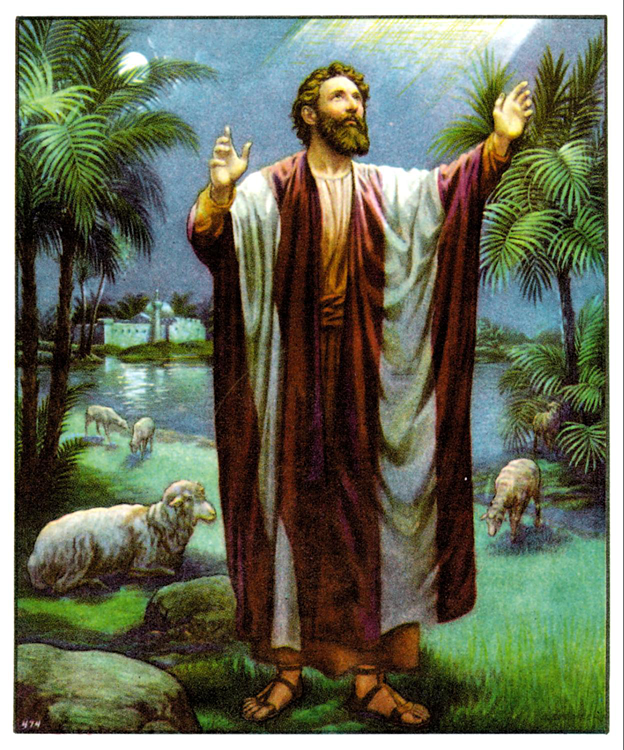
Genesis 24:2, 9, Your hand under my thigh. (Heb. yarek; see also Gen 47:29) Abraham’s servant literally placed his hands on Abraham’s testicles swearing an oath on Abraham’s projected progeny, even as in modern times we place our hands on the Bible.
Interestingly, the word testicle or teste derives from the Latin words testis meaning “testimony, testify and testament.” Yarek is the same word the KJV translates “hollow of his thigh” in Genesis 32:25 and 32, although, in this case, it seems to be referring to the tendon of the hip.
What Abraham had his servant do seems a bit indiscreet if not lewd in our culture, yet this was obviously an accepted custom in this ancient culture.
You see, the Hebrews were a very earthy, simple and basic people in their day-to-day life; there were not a lot of pretenses or veneers. Yet in their understanding of and walk with Elohim, they were deep and had a broad understanding as evidenced through the pages of the Bible. Moreover, because they had the Torah, they were much wiser and at a higher level spiritually than the nations around them who had rejected Elohim and who, instead, worshipped sticks, rocks, trees, idols and demons resulting in all sorts of idolatrous and licentious perversions. Paul talks about this in Romans 1:18–32.
What is the take away here?
The Psalms in a couple of places tells us that the fool has said in his heart that there is no God/Elohim (Pss 14:1; 53:1). As highly developed and advanced intellectually and technologically as our modern society may be, most of the intelligentsia and erudite of our day are a bunch of educated idiots or fools, who deny the existence of Elohim, while they mock the Bible. Instead, most them, being the highly rationalistic and materialistic people that they are, they worship their own minds, their own bodies and other material things all of which, by biblical definition, are idols. Moreover, they believe in unproven theories or mythologies like macro-evolution and they predict the end of the world in a few decades due to global warming or climate change. Like the ancients, many of them worship the same demons and sacrifice their children to the same demon gods (called abortion) as their ancient Baal and Moloch worshiping predecessors.
You know what? I’ll take the “crude,” earthy and basic Hebrews any day, who knew Elohim and obeyed him, had a deep knowledge of spiritual matters, and possessed wisdom and understanding of life issues over the high-minded intellects, who in all of their erudition have totally missed Elohim and in reality still worship sticks, stones, trees and material objects (e.g. homes, money, boats, cars, art objects, political power, education, their bodies) and believe in mythologies rather than the one true YHVH Elohim of the Bible.
I’m reminded of something that Paul the apostle wrote some 2,000 years after the time of Abraham (things hadn’t changed much from Abraham to Paul, and they haven’t changed much from Paul till now either, for human nature remains the same).
For the message of the cross is foolishness to those who are perishing, but to us who are being saved it is the power of God. For it is written: “I WILL DESTROY THE WISDOM OF THE WISE, AND BRING TO NOTHING THE UNDERSTANDING OF THE PRUDENT.” Where is the wise? Where is the scribe? Where is the disputer of this age? Has not God made foolish the wisdom of this world? For since, in the wisdom of God, the world through wisdom did not know God, it pleased God through the foolishness of the message preached to save those who believe. For Jews request a sign, and Greeks seek after wisdom; but we preach Christ crucified, to the Jews a stumbling block and to the Greeks foolishness, but to those who are called, both Jews and Greeks, Christ the power of God and the wisdom of God. Because the foolishness of God is wiser than men, and the weakness of God is stronger than men. For you see your calling, brethren, that not many wise according to the flesh, not many mighty, not many noble, are called. But God has chosen the foolish things of the world to put to shame the wise, and God has chosen the weak things of the world to put to shame the things which are mighty; and the base things of the world and the things which are despised God has chosen, and the things which are not, to bring to nothing the things that are, that no flesh should glory in His presence. But of Him you are in Christ Jesus, who became for us wisdom from God—and righteousness and sanctification and redemption— that, as it is written, “HE WHO GLORIES, LET HIM GLORY IN THE LORD.” (1 Cor 1:18–31)
You know what? In light of what the Bible, the Word of Elohim, has to say on this subject, I really don’t mind being being a “fool” for YHVH Elohim-Yeshua!






